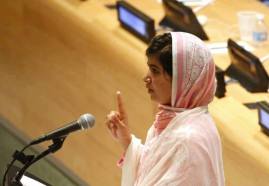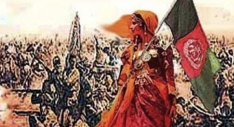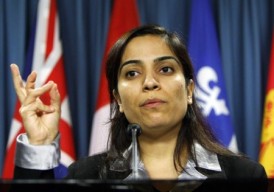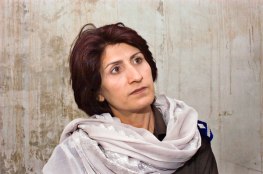Malala has become a very famous name in the western world, thanks to Malala Yousafzai, a Pakistani human rights activist. Born in July 1997, she has already been nominated for a Nobel Peace Price. Her “career” started when she was just eleven years old, writing an anonymous blog for BBC Urdu (after Pashto her second language) about being a schoolgirl in the Pakistani Swat Valley. She grew to be one of the most inspiring activists advocating the right to education.
Malala was shot in the head by the Pakistani Taleban in 2012. She survived the attack and escaped to the UK with her family. Since then, she caused a massive hype in western media and impressed with her public appearances, most notably her speech at the UN and a witty interview on “The Daily Show with Jon Stewart”.
Looking for the origin of Malala’s first name, one has to study the history of the late 19th century Afghanistan – the time of “Malalai of Maiwand”, one of the most famous Afghan and Pashtun heroines .
During the 19th century the British occupied Afghanistan, leading not to one, not two, but three Anglo-Afghan-Wars. In German literature this episode has become well known through Theodor Fontane’s poem “Das Trauerspiel von Afghanistan” – The tragedy of Afghanistan – which describes the disastrous British retreat from Kabul in 1842 during the First Anglo-Afghan War.
What is less known in the West, however, is the story of Malalai (or Malala) of Maiwand. She was born around 1861 in the southern Afghan province of Kandahar. In 1880 it is told that both her father as well as her fiancé joined the Pashtun forces against the British in the battle of Maiwand – thought to be one of the principal battles of the Second Anglo-Afghan War. Like many other women, Malalai was there to help looking after soldiers and caring for the wounded.
Without going into history too much this is how the legend goes: Although being weaker in number the tide of the battle turned in favour of the British, as the Afghan fighters started to lose their morale. Malalai saw this danger and – according to the legend – took off her veil and shouted out:
“Young love! If you do not fall in the battle of Maiwand,
By God, someone is saving you as a symbol of shame!”
Apparently, this brave girl shamed the Afghan fighters so much that they started to reinforce their attacks again. Also, as one of the flag-bearers was shot by the British, Malalai took up the flag herself – the sujet of many depictions of her. Some sources also say that she made a flag out of her veil. Malalai was killed in the battle, being only around 18. Still, the Afghan forces, spurred by her words, defeated the British in the “Battle of Maiwand”.
So not surprisingly, Malala Youzoufsai’s parents chose the name for her daughter after this famous Pashtun heroine. And indeed, Malalai of Maiwand serves as namesake for a lot of women, especially in Afghanistan. Among them are several well known public figures. Two of them are portrayed here.
Some people may know Malalai Joya, who briefly sat in the Afghan Parliament, until she was kicked out because she was accused of insulting the Parliament. She surely is no fan of some of the people sitting in Parliament and the Warlords ruling the country today. Even more remarkable, she’s never been afraid to say so, shouting it right into their faces (like literally, check here).
Of course her activism has left her exposed to a lot of physical danger. Receiving numerous death threats (some of them even from inside the Parliament), she keeps on changing her location constantly, only going out in the blue “chadri” and keeping her security guards with her all the time. In an interview the now 35-year-old says, “It really is a big problem just to be alive.” She released the book “A Woman among Warlords” – a very interesting read. And also a documentary on her life has been produced.
Malalai Joya has been criticized for the way she works from different sides, but she certainly is a very interesting person, even if you don’t agree a hundred percent on everything she’s said or done.
Another famous Malalai is Malalai Kakar. Born in 1967, she was a policewoman in Afghanistan. And not just that, she was the head of Kandahar’s department of crimes against women. Thus, she was the most high-profile policewoman in Afghanistan after 2001, in a city that certainly is not a walk in the park for any woman in the police force. When Kakar joined the police in 1982, she was following the footsteps of her father and her brothers. During the Taleban rule she was prevented from working, but went back to work after 2001.
Her most famous episode was probably when she killed three would-be assassins in a shoot-out. Contrary to that, her everyday life was, according to herself, more about tackling theft, fights and murders. She was also mother to six kids. In 2008 Malalai Kakar was shot dead by Taleban gunmen in Kandahar. It’s a sad coincidence that he meaning of the name Malala or Malalai in Pashto is “grieve stricken”.



